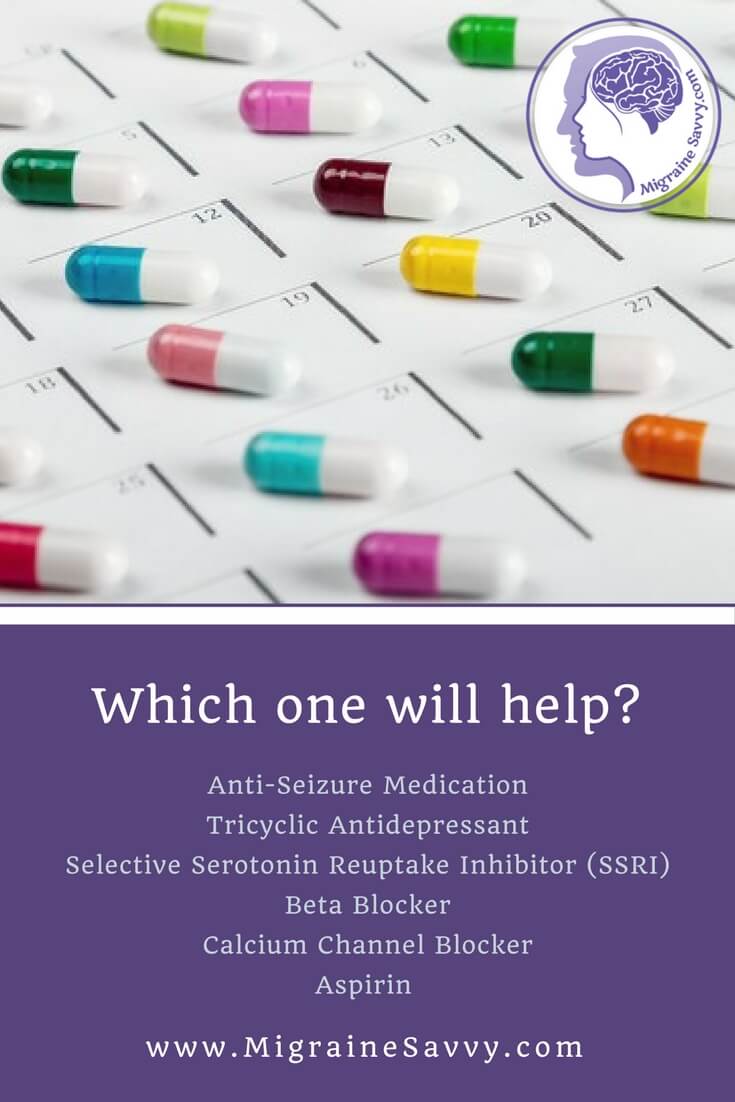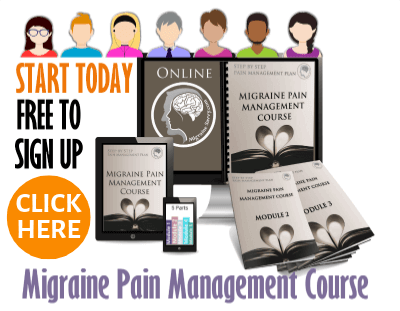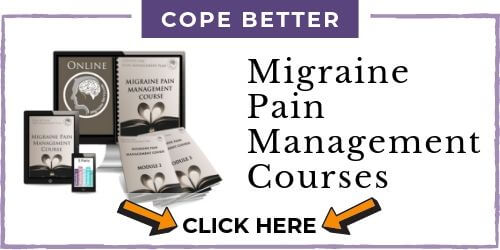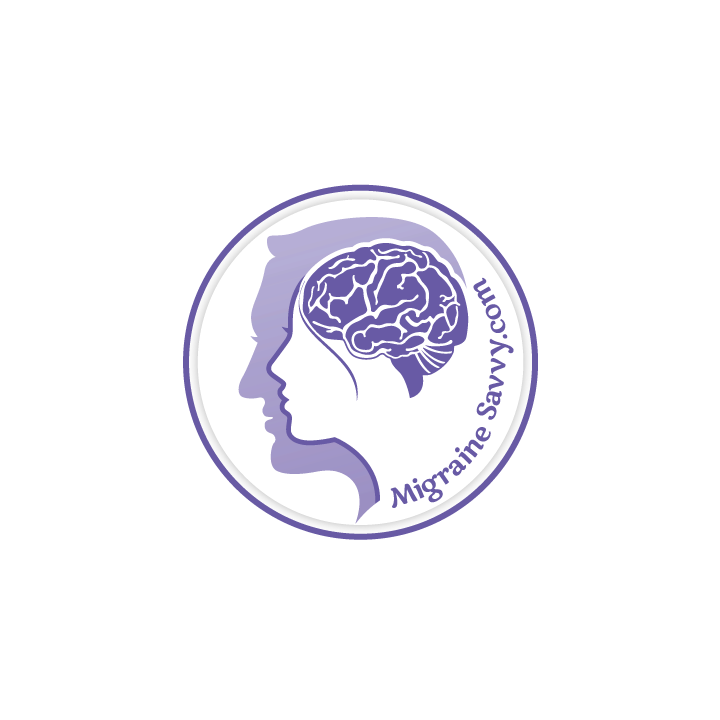- Home
- Prevention Tips
- The Best Migraine Prevention Medications
COMPLETE MAGNESIUM SUPPORT
My Top Choice - Magnesium Breakthrough - The ONLY supplement with all 7 essential magnesium types in one formula. Most only have 1-2 types, leaving you deficient.
- Home
- Medications
- The Best Migraine Prevention Medications
Migraine Prevention Medications: What Is The Best One?
First Line Treatment | The List | Anti-Seizure Medications | Tricyclic Antidepressants | SSRI’s | Beta Blockers | Calcium Channel Blockers | NSAID's | Aspirin | Botox | Anti-Nausea | Alternatives
Here's a list of migraine prevention medications you might consider to help prevent your next attack. The details and common side effects are listed below.
It will be helpful to prepare and educate yourself before and after your doctor’s appointments with this information, so it doesn't sound like Latin or Klingon and you get lost in a sea of confusion.
After all... you are learning a new language. And the best one will be the one that works for you...
I sure wish I had the internet as a resource when I was trialing medications to better prepare myself.
Back then I just relied on what my one general family physician said. It was like the word of God!
WOW! That does make me sound old. Well, I am... but I want to highlight the huge amount of available resources and information available to you now.
I urge you to do some research. Read and make sure you know what you are taking before you take it.
Your pharmacist is also a wealth of knowledge, so don't be afraid to ask questions.
The aim of migraine prevention medications is to lessen the frequency, intensity and duration of the migraine attacks.
In some cases, much lower doses are required than those used to treat the initial common or coexisting disorder.
What I mean is that most medications listed below were not originally invented with migraines in mind. The benefit for migraine reduction was stumbled upon much later.
Talk to your doctor about what you want from your medications, so you are both clear. Doctors aim for noticeable reduction (50%), you may want more.
Plus, not all doctors know how to treat migraines so please search for one that does specialize in, and have success with, treating migraine headaches.
The Best Prescription Migraine Medicine First Line Treatment
These four migraine prevention medications are FDA approved and are most likely what your doctor will prescribe first (first line treatment):
- Divalproex sodium (Depakote®)
- Propranolol (Inderal®)
- Timolol (Blocadren®)
- Topiramate (Topamax®)
Taking the right dose for a good trial period is essential to determine what will be most effective at reducing your attacks.
It might take 3 months or more to see results.
You may need to reduce the dose if you are experiencing side effects. This is called 'titration' and needs to be discussed with your doctor.
For getting more help from your Doctor's visit, feel free to use the Doctor's treatment strategy form on migraine prescription medication to organize your pain medications.
Also, please note that you may need both migraine prevention medications and an acute triptan medication to deal with your migraines effectively.
The List Of Migraine Prevention Medications
Beta blockers,
Calcium channel blockers and the Antidepressants are all considered first line treatment agents.
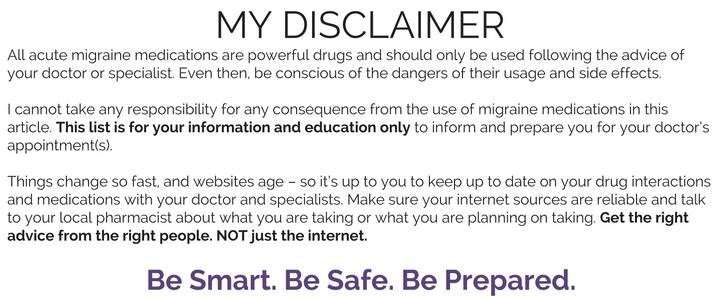
Here is your list of migraine prevention medications to peruse:
Anti-Seizure Medications
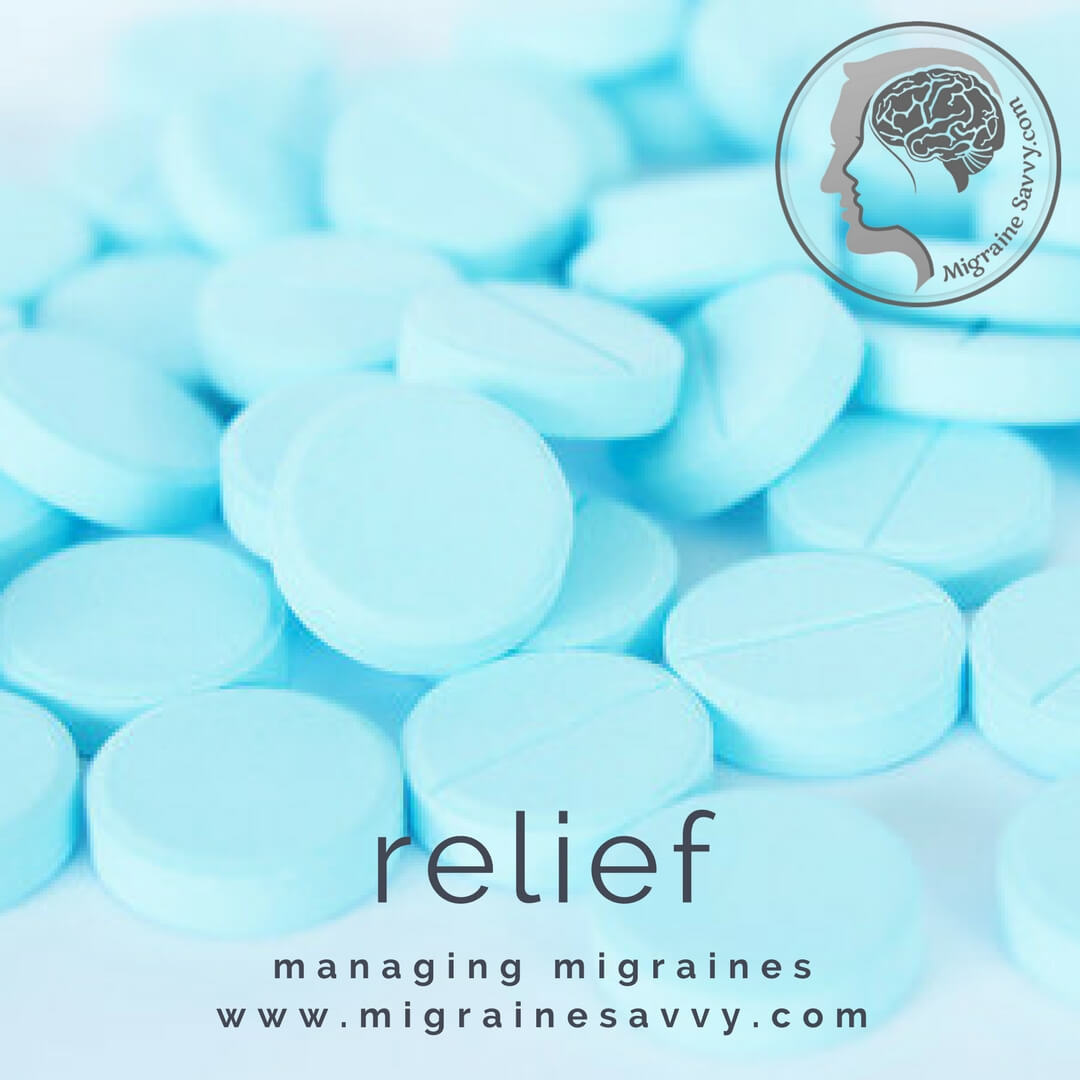
- Gabapentin (Neurontin®, Gralise and Horizant)
- Sodium Valproate (Epilim®)
- Topiramate (Topamax®)
- Valproic Acid (Depakote®, Epival, Epival VR, Valance, Diprate OD)
Used for: epilepsy and other seizure disorders, and
reduce frequency of migraines at much lower doses that required to treat
common disorder.
Common side effects: hair loss, weight gain (except
weight loss with Topiramate), cramps, dizziness, nausea and vomiting,
reflux, tremor, heartburn, skin rash or strange sensations like itching
or prickling (paresthesias).
Tricyclic Antidepressants
- Amitriptyline (Elavil®, Endep®)
- Nortriptyline (Pamelor®, Aventyl®)
- Protriptyline (Vivactil®)
Used for: depression, insomnia or sleep disturbances, anxiety and reducing migraines by affecting the level of the brain chemical serotonin.
Common side effects: dizziness, weight gain, fatigue, dry mouth, arrhythmia's, blurred vision, urinary hesitancy and reduced libido (sex drive).
Selective Serotonin Reuptake Inhibitors (SSRI’s)
- Sertraline (Zoloft®, Lustral®)
- Fluoxetine (Prozac®, Sarafem®, Fontex®)
- Venlafaxine (Effexor or Efexor®) is an SNRI – serotonin and norepinephrine reuptake inhibitor
- Paroxetine (Aropax®, Paxil®, Seroxat®, Sereupin®)
Used for: co-existing depression and anxiety also found to reduce migraines by affecting the level of the brain chemical serotonin. According to Emergency Medicine it is safe to use triptans and SSRI’s concomitantly.
Common side effects: gastrointestinal distress, tremor, weight gain or loss, decreased libido, and sexual erectile dysfunction (anorgasmia).
Beta Blockers
- Propranolol (Inderal®, Timolol®)
- Nadolol (Corgard®)
- Metoprolol (Lopressor®)
Used for: high blood pressure and coronary artery disease. They are well tolerated and proven effective for migraine prevention.
Common side effects: cold hands, fatigue, depression, nausea, insomnia, dizziness and shortness of breath (asthma).
Calcium Channel Blockers
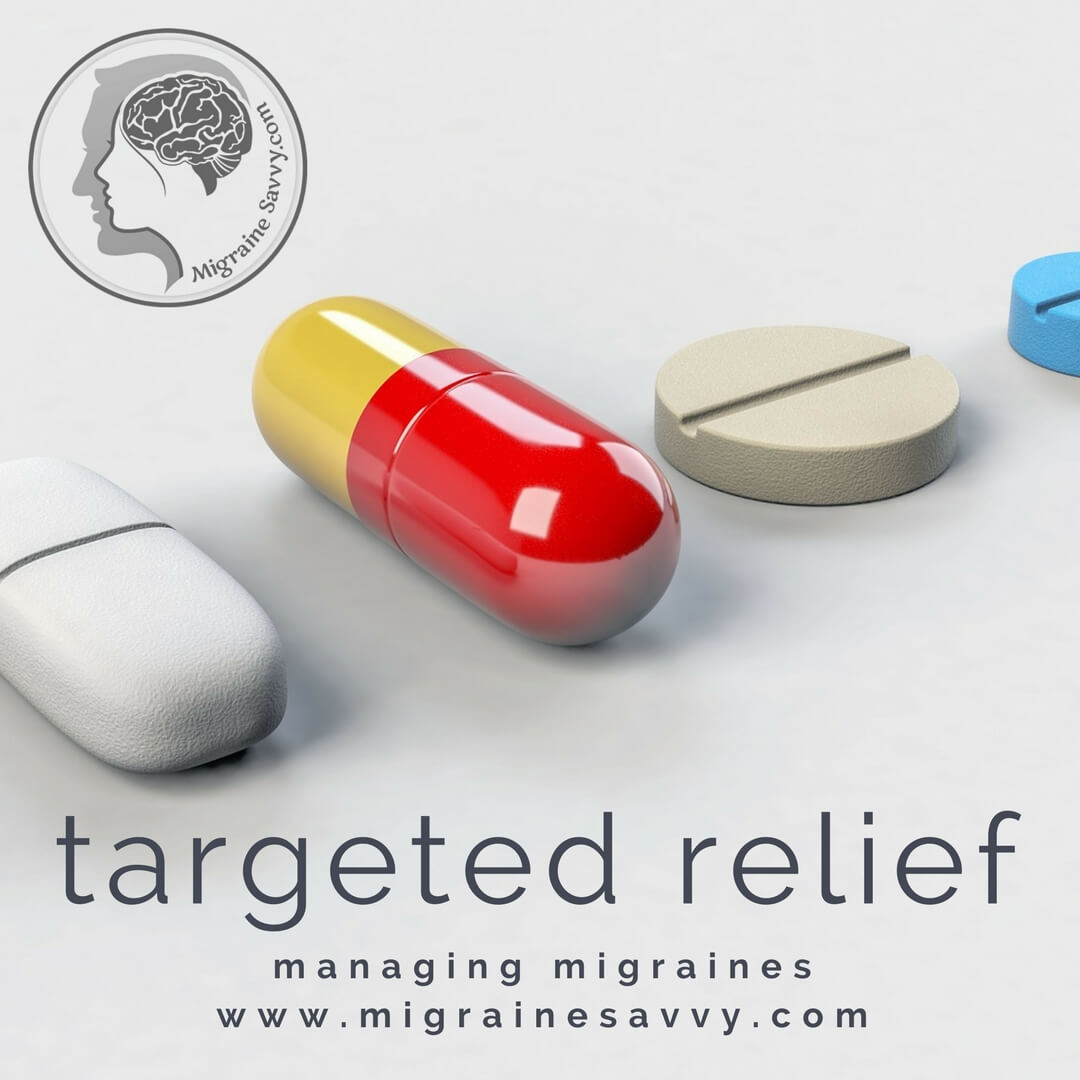
- Verapamil (Covera-HS®, Calaptin, Sinso,Tarka which is Verapamil and Trandolapril here in Australia )
- Diltiazem (Cardizem, Cartia XT, Dilacor XR®, Tiazac)
- and some of the anti-hypertensive medications: Lisinopril (Prinivil®, Zestril®) and Candesartan (Atacand®)
Used for: cardiovascular problems and the
antihypertensive migraine prevention medications are used for reducing
the length and severity of migraines. Evidence studies have found that
they are more effective with cluster headaches rather than migraines.
Common side effects: drowsiness, ankle edema, weight gain, constipation, dizziness and low blood pressure.
NSAIDs (Non-steroidal anti-inflammatory drugs)
NSAIDs work by blocking the body's chemical messengers that cause inflammation and swelling. They target pain resulting from tissue damage and inflammation. They can also reduce fever.
NSAIDs available over-the-counter in most pharmacies include:
- Aspirin (Disprin, Aspro Clear, Aspro, etc)
- Diclofenac (Voltaren, Viclofen, etc)
- Ibuprofen (Advil, Nurofen, Panafen, etc)
- Naproxen (Naprogesic, etc)
- Mefenamic acid (Ponstan)
Each one has different dosage requirements depending on the drugs and formulation used. And the brand names vary between countries.
Common side effects: nausea, heartburn, and gastrointestinal bleeding, salt and fluid retention.
About 10% of asthma sufferers can be sensitive to NSAIDs. Out of the above NSAIDs, Ibuprofen is the most common one used for headache and migraine. Ibuprofen also had the least stomach upset and can be taken on an empty stomach but my chemist says to always take it with a full glass of water for better absorption.
Let's Talk About Aspirin
- Bayer Aspirin, Bufferin, Ecotrin, and Zorprin
Just to name a few. There are too many brands and forms of aspirin to list here.
Used for: to reduce fever and inflammation, colds and flu’s, headaches, and at 325 mgs has had good results with migraine incidence in men. It is recommended for people with migraine aura. I get an aura before each attack but no doctor has recommended Aspirin for me as a prophylactic. Hmmm...
Common side effects: heartburn; nausea; upset stomach. Warnings: avoid alcohol and it is not recommended for children (possible Reye's syndrome) or teenagers.
Severe allergic reactions for Aspirin are: rash;
hives; itching; difficulty breathing or tightness in the chest; swelling
of the mouth, face, lips, or tongue; black or bloody stools; confusion;
diarrhea; dizziness; drowsiness; hearing loss; ringing in the ears;
severe or persistent stomach pain; unusual bruising; and vomiting or
vomiting blood.
Please note that this is not a complete list of all side
effects that may occur. All the migraine prevention medications listed
above will also have severe side effects – please contact your doctor
or pharmacist ASAP if anything suspicious occurs.
If you have any questions AT ALL about the side effects you are
experiencing please contact your health care provider ASAP. Call your
doctor or talk to your local pharmacist for medical advice about side
effects.
To report side effects to the appropriate agency, please click here for the FDA website guide to reporting drug related problems.
LOOKING FOR RELIEF ?
MIGRAINE PAIN MANAGEMENT COURSE
I have a step-by-step pain management plan in my course. The first module is free so you can learn to manage your attacks asap... continue reading
Botulinum Toxin A (Botox) Injections
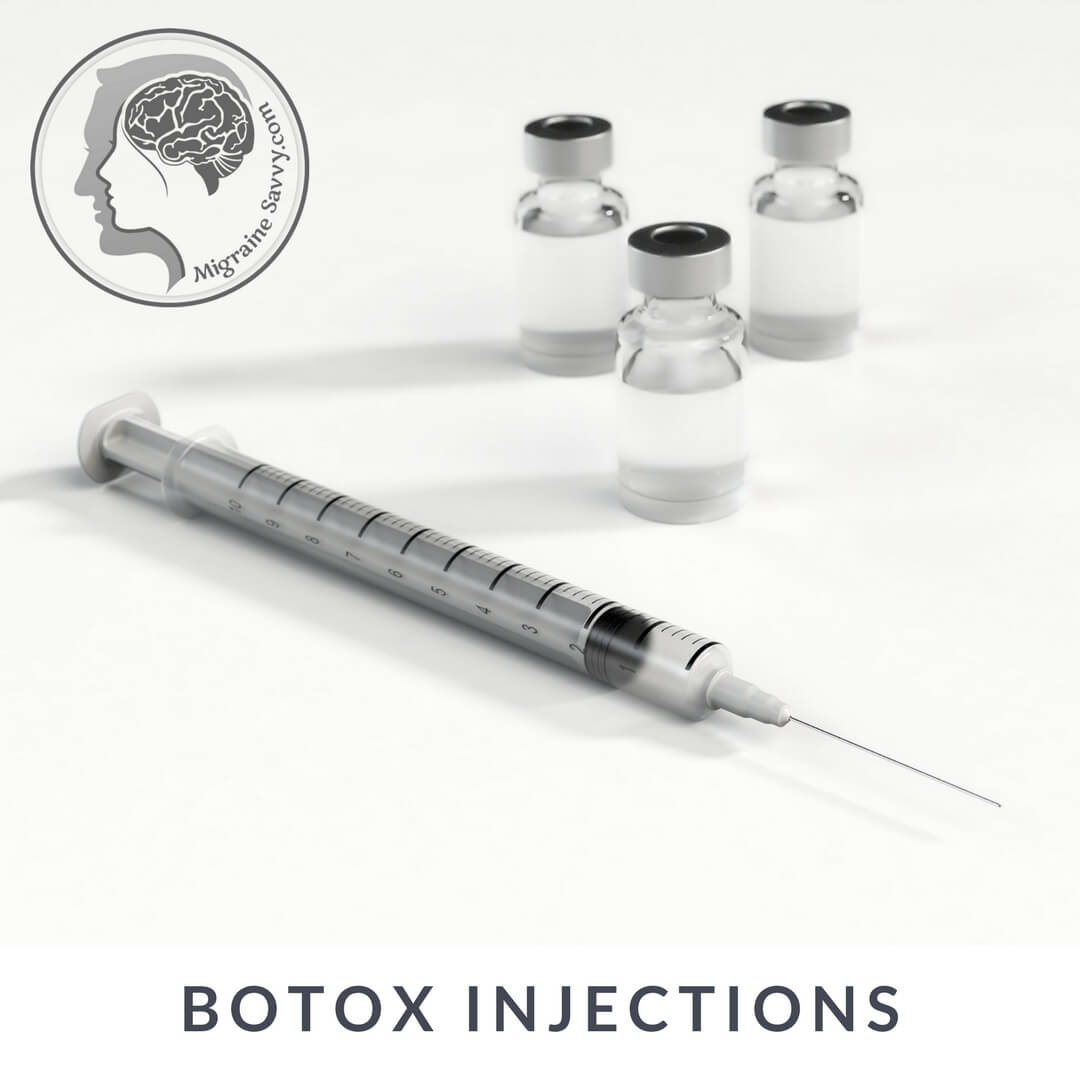 Find The Best Prescription Migraine Medicine Information @migrainesavvy
Find The Best Prescription Migraine Medicine Information @migrainesavvyUsed for: wrinkles, chronic daily headaches over 15 days per month. This drug is injected into muscles at the sites of pain in the neck, face, and head in doses up to 100 units every 3 – 4 months.
Common side effects: mild pain, aching and bleeding at the site of injection, increase in headache condition, drooping eyelid, and dry mouth.
Here are the links to the articles I've already written on Botox:
For Nausea
- Metoclopramide (Other brand names are: Metozolv ODT, Reglan®)
- Prochlorperazine (Brand name: Compazine®)
- Promethazine (Brand name: Phenergan®)
Medications used to treat migraines also treat other ailments. They are not specific just for migraine treatment. Analgesics, narcotics, and barbiturates can be addictive, so they are used less in most instances by your doc.
Your doctor might try you on other drugs like a narcotic analgesic - Codeine
(or Fioricet, or Tylenol #3) which can also be used as a "backup" for the
occasions when a specific drug does not work.
This would be worth checking on it's own to see if it helps at all first.
My doctor separated Codeine out for me to use, it didn't touch the side of my pain, so I no longer take it.
This is good for me as it caused constipation. Who wants that?
Holly's Helpful Tip: Get Codeine in a separate script and use it alone to see if it works to stop your pain phase. If it doesn't... don't use it or anything with Codeine in it. It's addictive and causes constipation which is not good for you at all.
What Is the Best Medicine For Migraine Headache?
In my experience, to abort an acute attack, a combination works best.
A triptan with: an acetaminophen OR NSAIDs like
aspirin, ibuprofen, or naproxen.
I used Naramig for over 10 years and found it to be effective.
But that's NOT a prevention strategy.
Alternatives To Migraine Prevention Medications
Just in case you'd like a list of alternatives to migraine prevention medications like: bio-identical hormones, minerals, melatonin, vitamins and herbs, please click on these links to read a bit more about:
My #1 Choice in Magnesium Supplements
More Ways To Prevent Migraines
The best way to prevent migraines is to get your pain management plan sorted and be proactive.
A recent study has proven that walking for 40 minutes 3 times a week was as effective at migraine prevention as 200 mgs of topiramate! [4]
So don't underestimate healthy lifestyle choices.
I talk about all of this including managing stress in my eBook and eCourse.
In the course I cover food and supplement experiments and provide an easy step by step plan to make your way through the incredible amount of new things you need to learn, including medications, for establishing long term coping skills.
Wishing you a pain free day,
WANT MORE TIPS? Subscribe to my newsletter and follow along on Facebook and Pinterest for all of the latest updates.
MIGRAINE MEDICATIONS Related Articles
How to be more MIGRAINE SAVVY right now...
Migraine Prevention Medications References:
1. MayoClinic.com Migraine (March 2015): Treatment and Drugs. Available at: http://www.mayoclinic.com/health/chronic-daily-headaches/ basic-treatments Accessed June 24, 2016.
2. Tepper, Deborah (2013) Prevention of Migraine. Headache: The Journal of Head and Face Pain. Available at: http://onlinelibrary.wiley.com/wol1/doi/10.1111/head.12191/full Accessed August 8th, 2016.
3. Teitelbaum, Dr. J. (2010) Magnesium for pain relief. Psychology Today: Complementary Medicine. Available at: http://www.psychologytoday.com/blog/complementary-medicine/201009/magnesium-pain-relief Accessed June 12, 2016.
4. Emma Varkey, Asa Cider, Jane Carlsson and Mattias Linde (2011) Study - Exercise as migraine prophylaxis: A randomized study using relaxation and topiramate as controls Updated Mar. 9, 2019
